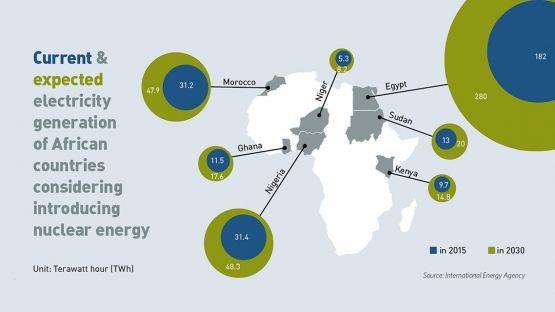Years back, nuclear energy was a fancy option limited to the industrialized world. In due course, nuclear could be an energy source for much of Africa, where only South Africa currently has a nuclear power plant.
Governments across the continent are devising development policies to become middle-income countries in the medium term. Socioeconomic growth comes with a rise in energy demand—and a need for a reliable and sustainable energy supply.
For industrializing countries in need of a clean, reliable and cost-effective source of energy, nuclear is an attractive option.
“Africa is hungry for energy, and nuclear power could be part of the answer for an increasing number of countries,” says Mikhail Chudakov, deputy director general and head of the Department of Nuclear Energy at the International Atomic Energy Agency (IAEA), an international organisation that promotes the peaceful use of nuclear technology.
A third of the almost 30 countries currently considering nuclear power are in Africa. Egypt, Ghana, Kenya, Morocco, Niger, Nigeria and Sudan have already engaged with the IAEA to assess their readiness to embark on a nuclear programme. Algeria, Tunisia, Uganda and Zambia are also mulling the possibility of nuclear power.
“Energy is the backbone of any strong development,” says Nii Allotey, director of the Nuclear Power Institute at the Ghana Atomic Energy Commission. “And where do we get energy from? We have hydro, thermal, fossil fuels, and we have local gas—but these are dwindling. They are limited; fossil fuels could run out by 2030. And, the prices are volatile.”
For Ghana, cost-effective, reliable electricity is the entry point to higher-value-added manufacturing and export-led growth. For example, the country’s reserves of bauxite—the ore used to produce aluminium—are an important source of income, but for now it is exported raw.
“We have a smelter, but it’s not operating at full capacity because electricity is too expensive,” Mr. Allotey says. “If we had cost-effective electricity, we would not be exporting raw bauxite, but exporting smelted bauxite at a much higher price. This would be a big move for Ghana.”
Energy is the backbone of any strong development. And where do we get energy from? We have hydro, thermal, fossil fuels, and we have local gas—but these are dwindling. They are limited; fossil fuels could run out by 2030. And, the prices are volatile.






